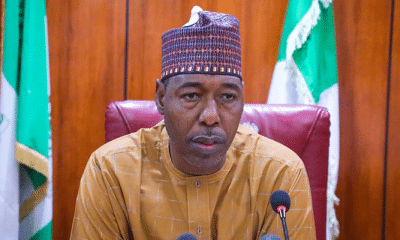Nigeria News
Tax Reform Bills: Presidency Highlights Economic Risks Of Prolonged Passage

The Presidency has addressed criticisms regarding the perceived haste in advancing the Tax Reform Bills, highlighting the extensive groundwork that preceded their introduction.
The Senior Special Assistant to the President on Media and Publicity, Temitope Ajayi, clarified via X on Monday that the reforms stem from 14 months of rigorous work by over 80 experts from various parts of the country.
Ajayi stressed that delaying the bills would mirror the two-decade-long legislative gridlock that plagued the Petroleum Industry Bill (PIB), which caused significant economic setbacks.
“It is very disingenuous to say that the Tax Reform Bills, the product of 14 months of extensive work by over 80 professionals drawn from every part of the country, are being rushed through the National Assembly.
“The suggestion that it took the PIB over 20 years to get through the parliament is backward thinking. Nigeria lost too much for the failure to pass the PIB on time in terms of revenue, investments, and jobs in the oil & gas sector,” Ajayi stated.
He also shared a timeline detailing the meticulous process behind the development of the tax reforms, underscoring the urgency of their passage to stabilize Nigeria’s economy amidst dwindling oil revenues and increasing debt.
Zulum Expresses Caution
Meanwhile, Borno State Governor Babagana Zulum has expressed reservations about the bill’s speed through the legislative process.
Speaking to BBC Hausa, Zulum compared the accelerated timeline of the tax reforms to the PIB, which took almost 20 years to pass.
He urged for a more deliberate approach, warning that the rushed process could have long-term implications for the country, particularly for northern states, where the economic impact might be minimal compared to Lagos State.
“Why the rush? The Petroleum Industry Bill took almost 20 years before it was finally passed. But this tax reform bill is being transmitted and receiving legislative attention within a week. It should be treated carefully and with caution so that even after our exit, our children will reap its benefits,” Zulum stated.
Lessons from the PIB Delay
Ajayi highlighted the prolonged journey of the PIB as a cautionary tale, emphasizing how political disagreements and lack of urgency hindered Nigeria’s ability to modernize its oil sector.
The delay resulted in missed investment opportunities, reduced revenues, and stunted job creation.
“We should not wait for another 20 years to do what is right for our country,” Ajayi warned, stressing that the Tax Reform Bills are critical to diversifying Nigeria’s economy and addressing its fiscal challenges.
Call for Swift Action
Ajayi dismissed allegations of ulterior motives behind the bill’s progress, reiterating that the reforms aim to strengthen Nigeria’s economic foundation.
He urged lawmakers to prioritize national interests over political differences and act swiftly to avoid jeopardizing the country’s financial future.
“The most important thing is to be upright in your decision, transparent, and accountable,” Ajayi stressed, calling for urgent legislative approval to propel Nigeria toward economic stability and growth.












